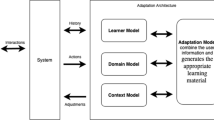Abstract
In this paper we illustrate how to conceive, implement and play adaptive Units of Learning (UoLs) that embed educational videogames. For this purpose we describe The Art & Craft of chocolate UoL, with the game Paniel and the chocolate-based sauce adventure as a key feature. The UoL includes a pre-test whose outcome is used to adapt the game. The UoL also assesses the learning process using an in-game exam. This UoL has been modeled using IMS Learning Design (LD), and the embedded game has been developed using the < e − Adventure > educational game engine. This UoL may be deployed in any LD-compliant environment, although some of the features like the adaptation of the game or automatic assessment require special plug-ins that enable the communication between the environment and the < e − Adventure > engine. These plug-ins have been developed as an open-source modification of the SLeD player.
Preview
Unable to display preview. Download preview PDF.
Similar content being viewed by others
References
Amory, A., Naicker, K., Vincent, J., Adams, C.: The Use of Computer Games as an Educational Tool: Identification of Appropriate Game Types and Game Elements. British Journal of Educational Technology 30(4), 311–321 (1999)
Betz, J.A.: Computer Games: Increase Learning in an Interactive Multidisciplinary Environment. Journal of Educational Technology Systems 24(2), 195–205 (1996)
Birbeck, M., et al.: Professional XML, 2nd edn. Wrox Press (2001)
Brusilovsky, P.: Adaptive Educational Systems on the World-Wide-Web: A Review of Available Technologies. In: WWW-Based Tutoring Wprkshop at 4th International Conference on Intelligent Tutoring Systems, San Antonio, USA (1998)
Burgos, D., Tattersall, C., Koper, R.: Can IMS Learning Design be used to model computer-based educational games? Binaria, 5 (2006)
Burgos, D., Moreno-Ger, P., Sierra, J.L., Fernández-Manjón, B., Koper, R.: Authoring Game-Based Adaptive Units of Learning with IMS Learning Design and <e-Adventure>. International Journal of Learning Technology (Special Issue on Authoring Adaptive and Adaptable Hypermedia) (in Press)
Coombs, J.H., Renear, A.H., DeRose, S.J.: Markup Systems and the Future of Scholarly Text Processing. Communications of the ACM 30(11), 933–947 (1987)
ESA, E.S.A. Essential Facts about the Computer and Videogame Industry (cited April 8, 2007) (2005), available from: http://www.theesa.com/files/2005EssentialFacts.pdf
Garris, R., Ahlers, R., Driskell, J.E.: Games, Motivation and Learning: A Research and Practice Model. Simulation & Gaming 33(4), 441–467 (2002)
Gee, J.P.: What video games have to teach us about learning and literacy, p. 225. Palgrave Macmillan, New York, Basingstoke (2003)
IMS Global Consortium. IMS Learning Design Specification (2005) (cited April 8, 2007), available from: http://www.imsproject.org/learningdesign/index.html
IMS Global Consortium. IMS Question & Test Interoperablity Specification (cited April 8, 2007) (2005), available from: http://www.imsglobal.org/question/index.html
Jenkins, H., Klopfer, E., Squire, K., Tan, P.: Entering the Education Arcade. ACM Computers in Entertainment 1(1) (2003)
Ju, E., Wagner, C.: Personal computer adventure games: Their structure, principles and applicability for training. The Database for Advances in Information Systems 28(2), 78–92 (1997)
Koper, R., Olivier, B.: Representing the Learning Design of Units of Learning. Educational Technology & Society 7(3), 97–111 (2004)
Koper, R., Tattersall, C.: Learning Design - A Handbook on Modelling and Delivering Networked Education and Training. Springer, Heidelberg (2005)
Malone, T.: What makes computer games fun? SIGSOC Bulletin 13(2-3), 143 (1982)
Malone, T.W., Lepper, M.R.: Making learning fun: A taxonomy of intrinsic motivations for learning. In: Snow, R.E., Farr, M.J. (eds.) Aptitude, learning and instruction III: Cognitive and affective process analysis, pp. 223–253. Lawrence Erlbaum, Hillsdale, NJ (1987)
Martinez-Ortiz, I., Moreno-Ger, P., Sierra, J.L., Fernández-Manjón, B.: Production and Deployment of Educational Videogames as Assessable Learning Objects. In: Nejdl, W., Tochtermann, K. (eds.) EC-TEL 2006. LNCS, vol. 4227, Springer, Heidelberg (2006)
Mitchell, A., Savill-Smith, C.: The Use of Computer and Videogames for Learning: A Review of the Literature. m-Learning, Trowbridge, Wiltshire: Learning and Skills Development Agency (2004)
Moreno-Ger, P., Martínez-Ortiz, I., Sierra, J.L., Fernández-Manjón, B.: Language-Driven Development of Videogames: The <e-Game> Experience. In: Harper, R., Rauterberg, M., Combetto, M. (eds.) ICEC 2006. LNCS, vol. 4161, Springer, Heidelberg (2006)
Moreno-Ger, P., Sierra, J.L., Martínez-Ortiz, I., Fernández-Manjón, B.: A Documental Approach to Adventure Game Development. Science of Computer Programming 67, 3–31 (2007)
OUUK. Sled player (2005) (cited April 8, 2007), available from: http://sled.open.ac.uk
Paramythis, A., Loidl-Reisinger, S.: Adaptive Learning Environments and eLearning Standards. Electronic Journal of eLearning 2(1), 181–194 (2004)
Prensky, M.: Digital Game Based Learning. McGraw-Hill, New York (2001)
Sierra, J.L., Fernández-Valmayor, A., Fernández-Manjón, B.: A document-oriented paradigm for the construction of content-intensive applications. The Computer Journal 49(5), 562–584 (2006)
Sim, G., MacFarlane, S., Read, J.: All work and no play: Measuring fun, usability, and learning in software for children. Computers & Education 46(3), 235–248 (2006)
Squire, K.: Game-Based Learning: An X-Learn Perspective Paper. MASIE center: e-Learning Consortium (2005)
Squire, K.: Video games in education. International Journal of Intelligent Simulations and Gaming 2(1), 49–62 (2003)
Van Deursen, A., Klint, P., Visser, J.: Domain-Specific Languages: An Annotated Bibliography. ACM SIGPLAN Notices 35(6), 26–36 (2000)
Vogten, H., Martens, H.: CopperCore 3.0 (2005) (cited April 8, 2007), available from http://www.coppercore.org
Vogten, H., Nadolski, M.H.R., Tattersall, C.: CopperCore Service Integration, Integrating IMS Learning Design and IMS Question and Test Interoperability. In: 6th IEEE International Conference on Advanced Learning Technologies, IEEE Computer Society Press, Kerkrade, The Netherlands (2006)
Author information
Authors and Affiliations
Editor information
Rights and permissions
Copyright information
© 2007 Springer-Verlag Berlin Heidelberg
About this paper
Cite this paper
Moreno-Ger, P., Burgos, D., Sierra, J.L., Manjón, B.F. (2007). A Game-Based Adaptive Unit of Learning with IMS Learning Design and <e-Adventure>. In: Duval, E., Klamma, R., Wolpers, M. (eds) Creating New Learning Experiences on a Global Scale. EC-TEL 2007. Lecture Notes in Computer Science, vol 4753. Springer, Berlin, Heidelberg. https://doi.org/10.1007/978-3-540-75195-3_18
Download citation
DOI: https://doi.org/10.1007/978-3-540-75195-3_18
Publisher Name: Springer, Berlin, Heidelberg
Print ISBN: 978-3-540-75194-6
Online ISBN: 978-3-540-75195-3
eBook Packages: Computer ScienceComputer Science (R0)




